高一定语从句40个常考不及物动词与介词固定搭配
高一英语必修一unit4定语从句

Do you know the girl in our class? Her hair is very short. Do you know the girl whose hair is very short in our class? He is the student. I broke his pencil yesterday. He is the student whose pencil I broke yesterday.
refere
nce
(4) 先行词是who或which引导的主句。 Who is the girl that drove the car? Who that broke the window will be punished? Which is the T-shirt that fits me most? Who is the man that is reading the newspaper over there?
• Mr. Turner is an artist. • She became a lawyer.
主系表
主谓双宾 主谓双宾 主谓宾宾补
• He gave his sister a book.
• I'll write you a long letter.
• I found the book easy. • I'll let him go.
refere
nce
that和which在指物的情况下一般都 可以互换,但在下列情况下,一般用 that而不用which。
(1) 限制性定语从句中先行词为all, everything, anything, nothing, none, few, little, some等不定代词指物时。 (something用that或which均可) Have you taken down everything that Mr. Li said? There seems to be nothing that is impossible to him in the world.
人教版高一英语必修二语法unit5-定语从句(4)介词+关系代词

e.g. The school in which he once studied is very famous.
他曾经上学的学校非常著名。
The girl about whom we are talking is a doctor.
我们正在谈论的那个女孩是个医生。
[即时演练1] 用“介词+关系代词”填空
介词+关系代词: 介词的选择
3. 根据主从句的句意确定介词
Air, without which man can’t live, is really important. The pen, with which he is writing now, was bought yesterday.
This is my pair of glasses, without which I cannot see clearly.
= of which the roof is red.
I know a boy whose father is a doctor. = the father of whom is a doctor. = of whom the father is a doctor.
三、“介词+关系代词”的拓展 1.复杂介词+关系代词 用于该结构中的关系代词有which, whom和whose。常用的 复杂介词有because of, in front of, as a result of, at the back of 等。 He was badly hurt in the accident, because of which he didn't go to work. 他在事故中严重受伤。因此,他没去上班。 They arrived at a farmhouse, in front of which sat a boy. 他们来到一座农舍,农舍前面坐着一个男孩。
高一英语:定语从句归纳总结
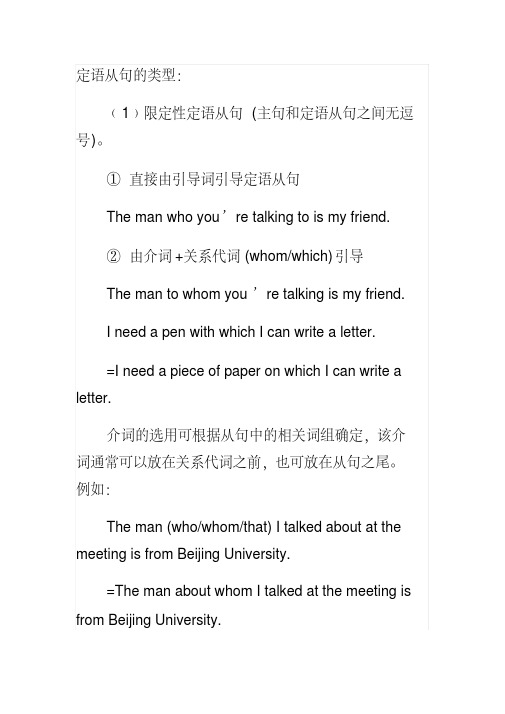
定语从句的类型:﹙1﹚限定性定语从句(主句和定语从句之间无逗号)。
①直接由引导词引导定语从句The man who you’re talking to is my friend.②由介词+关系代词(whom/which)引导The man to whom you’re talking is my friend.I need a pen with which I can write a letter.=I need a piece of paper on which I can write a letter.介词的选用可根据从句中的相关词组确定,该介词通常可以放在关系代词之前,也可放在从句之尾。
例如:The man (who/whom/that) I talked about at the meeting is from Beijing University.=The man about whom I talked at the meeting is from Beijing University.The palace (which/that) I often pay a visit to was built in the 17th century.=The palace to which I often pay a visit was built in the 17th century.﹙2﹚非限定性定语从句(主句和定语从句之间用逗号隔开)。
①直接由引导词引导定语从句。
②由介词+关系代词(whom/which)引导。
I live in a house far away from the city,in front of which is a big tree.There is an apple tree standing at the gate,on which are many apples.This is the man to whom I gave the book.③由“代词/名词+of+whom/which”或“of which/ whom +名词/代词”(先行词指人用whom,指物用which)引导。
定语从句不及物动词以及特殊情况的被动语态
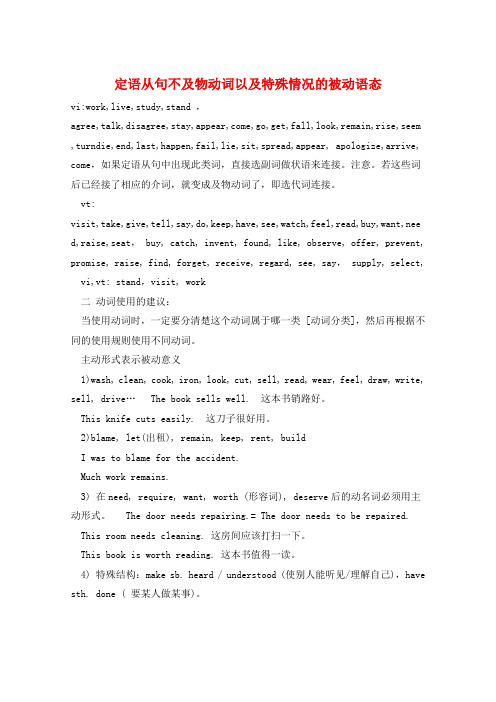
定语从句不及物动词以及特殊情况的被动语态vi:work,live,study,stand ,agree,talk,disagree,stay,appear,come,go,get,fall,look,remain,rise,seem ,turndie,end,last,happen,fail,lie,sit,spread,appear, apologize,arrive, come,如果定语从句中出现此类词,直接选副词做状语来连接。
注意。
若这些词后已经接了相应的介词,就变成及物动词了,即选代词连接。
vt:visit,take,give,tell,say,do,keep,have,see,watch,feel,read,buy,want,nee d,raise,seat, buy, catch, invent, found, like, observe, offer, prevent, promise, raise, find, forget, receive, regard, see, say, supply, select, vi,vt: stand,visit, work二动词使用的建议:当使用动词时,一定要分清楚这个动词属于哪一类 [动词分类],然后再根据不同的使用规则使用不同动词。
主动形式表示被动意义1)wash, clean, cook, iron, look, cut, sell, read, wear, feel, draw, write, sell, drive… The book sells well. 这本书销路好。
This knife cuts easily. 这刀子很好用。
2)blame, let(出租), remain, keep, rent, buildI was to blame for the accident.Much work remains.3) 在need, require, want, worth (形容词), deserve后的动名词必须用主动形式。
及物不及物动词、时态、非谓语动词和介词搭配
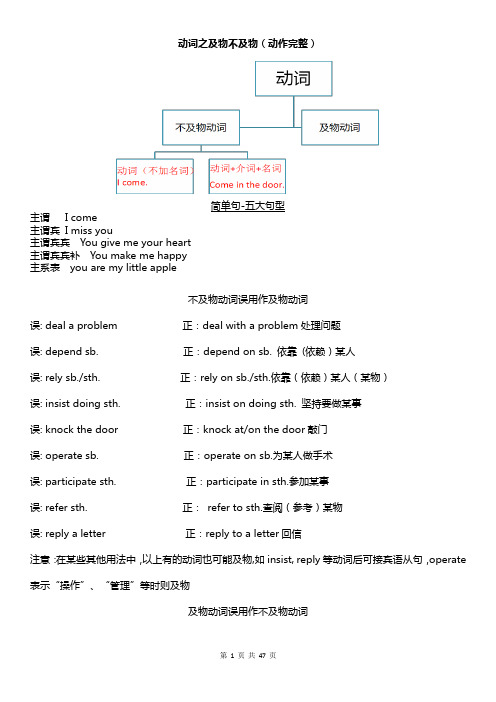
动词之及物不及物(动作完整)简单句-五大句型主谓I come主谓宾I miss you主谓宾宾You give me your heart主谓宾宾补You make me happy主系表you are my little apple不及物动词误用作及物动词误: deal a problem 正:deal with a problem处理问题误: depend sb. 正:depend on sb. 依靠(依赖)某人误: rely sb./sth. 正:rely on sb./sth.依靠(依赖)某人(某物)误: insist doing sth. 正:insist on doing sth. 坚持要做某事误: knock the door 正:knock at/on the door敲门误: operate sb. 正:operate on sb.为某人做手术误: participate sth. 正:participate in sth.参加某事误: refer sth. 正:refer to sth.查阅(参考)某物误: reply a letter 正:reply to a letter回信注意:在某些其他用法中,以上有的动词也可能及物,如insist, reply等动词后可接宾语从句,operate 表示“操作”、“管理”等时则及物及物动词误用作不及物动词动词原形-非谓语动词-谓语动词go going,to go,gone goes,went,will go等动词原形非谓语动词谓语动词六.非谓语动词测试1.The island, C to the mainland by a bridge,is easy to go to.A joiningB to joinC joinedD having joined解答:1.两个逗号之间的部分为后置定语,修饰句子主语the island.2.句子主语the island和非谓语动词join之间为被动关系(后面的by a bridge也暗示了这一点), 即:join the island to the mainland其中含有一个固定搭配:join A to B这也证明了the island和join之间为动宾关系,两者倒过来即被动关系.3.根据英语语法,所以选用过去分词joined构成的短语做the island的后置定语2. Sarah pretended to be cheerful, D nothing about the argument.A saysB saidC to sayD saying3. While walking (walk)his dog in the park yesterday afternoon,Bob heard someone shouting for help in the distance.4. I am not interested in pop music,because I often have difficulty in understanding(understand)the words.to do的意义语态:主动to do状态:未发生I want to go to visit my friend.She invited me to come.To catch the bus,he ran as fast as he can.目的状语doing的意义语态:主动doing状态:已发生He finished reading the book yesterdayThe woman giving us oral lessons is from America. = The woman who gives us oral lessons is from America.Walking along the street,we found a purse lying on the ground.=When we walked along the street,we found a purse lying on the ground.小测:To do PK doingHe is advised (stop)(think of)(go)abroad in these two years.done的意义语态:被动done状态:已发生,完成A retired teacher is cleaning the fallen leaves at school. 完成一位退休教师在清理学校的落叶。
必修一、必修二定语从句 介词加关系代词
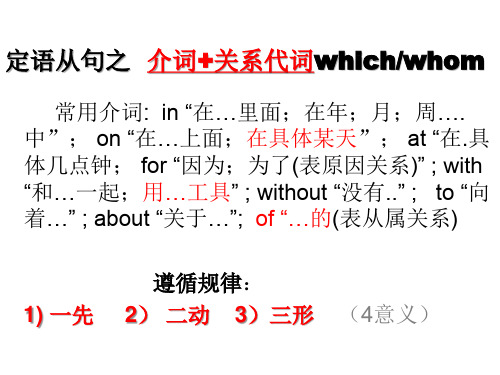
1) 一先
(4意义)
一:“一先” : 从先行词跟介词的搭配习惯或联系
1) The day on which/when Tom went to college was wonderful for him.(在具体的某一天用介词on) 2)The boy was educated at the high school, after which he went on to Beijing University.(从高中毕 业后用介词after). 3)Did you find the pen with which I wrote just now? (使用工具用介词with) 4) The reason why /for which Rose was late was that she couldn’t catch the first bus.(因为…原因 reaso词对介词的习惯 1)The computer for which I paid 5,000yuan is made in Shenzhen. ( pay 与for搭配) 2) Out there was a policeman ,to whom John could turn for which way he’ d like to go.(turn to sb.向 某人求助) 3)Do you know the girl ,with whom Jack shook hands just now? (shake hands with sb.和…人握 手)
定语从句之 介词+关系代词which/whom
常用介词: in “在…里面;在年;月;周…. 中”; on “在…上面;在具体某天”; at “在.具 体几点钟; for “因为;为了(表原因关系)” ; with “和…一起;用…工具” ; without “没有..” ; to “向 着…” ; about “关于…”; of “…的(表从属关系)
高一英语:定语从句归纳总结
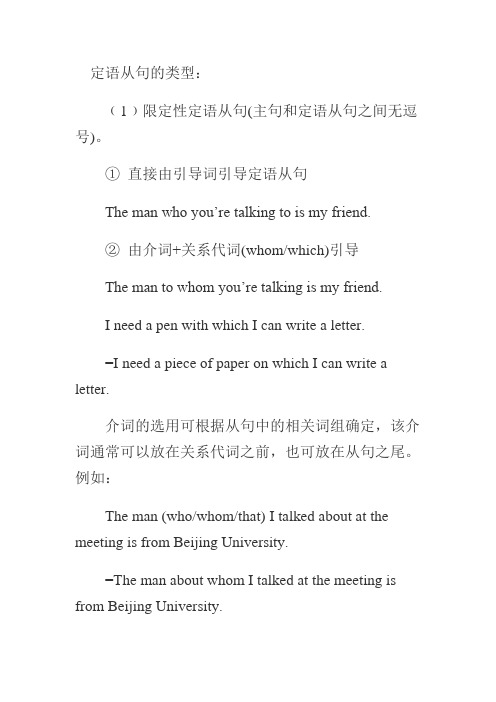
定语从句的类型:﹙1﹚限定性定语从句(主句和定语从句之间无逗号)。
①直接由引导词引导定语从句The man who you’re talking to is my friend.②由介词+关系代词(whom/which)引导The man to whom you’re talking is my friend.I need a pen with which I can write a letter.=I need a piece of paper on which I can write a letter.介词的选用可根据从句中的相关词组确定,该介词通常可以放在关系代词之前,也可放在从句之尾。
例如:The man (who/whom/that) I talked about at the meeting is from Beijing University.=The man about whom I talked at the meeting is from Beijing University.The palace (which/that) I often pay a visit to was built in the 17th century.=The palace to which I often pay a visit was built in the 17th century.﹙2﹚非限定性定语从句(主句和定语从句之间用逗号隔开)。
①直接由引导词引导定语从句。
②由介词+关系代词(whom/which)引导。
I live in a house far away from the city,in front of which is a big tree.There is an apple tree standing at the gate,on which are many apples.This is the man to whom I gave the book.③由“代词/名词+of+whom/which”或“of which/ whom +名词/代词”(先行词指人用whom,指物用which)引导。
高一定语从句40个常考不及物动词与介词固定搭配
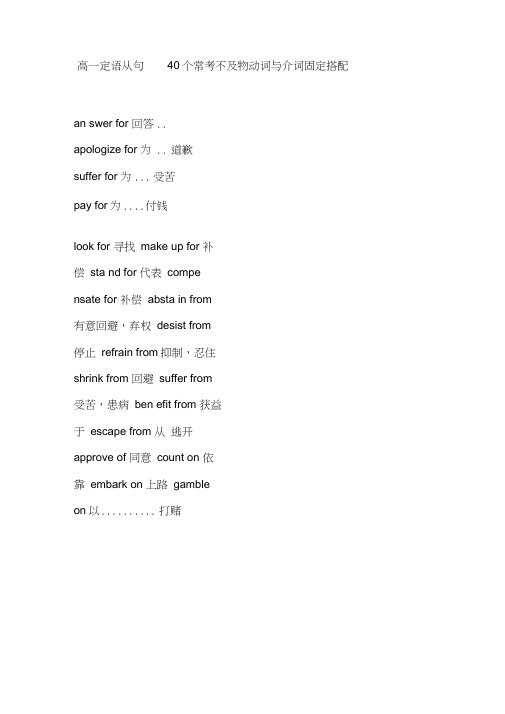
高一定语从句40个常考不及物动词与介词固定搭配an swer for 回答..apologize for 为 .. 道歉suffer for 为... 受苦pay for为.... 付钱look for 寻找make up for 补偿sta nd for 代表compensate for 补偿absta in from有意回避,弃权desist from停止refrain from抑制,忍住shrink from 回避suffer from受苦,患病ben efit from 获益于escape from 从逃开approve of 同意count on 依靠embark on 上路gambleon以.......... 打赌in sist on 坚持rely on依靠theorize on对.... 推理,对建立理论harp on 老提至U ...calculate on扌旨望,依靠concen trate on 集中至U ..depe nd on 依靠reckon on盼望,指望...account for说明,解释....boast of 吹牛consist of 由 ... 组成despair of 失望dream of梦想做某事repe nt of忏悔,懊悔believe in 相信 ...persevere in 坚持...revel in陶醉,着迷于 ...succeed in在某方面成功delight in 为.... 高兴join in 力口入... participate in 参力口persist in 坚持....specialize in专门从事某事,aim at瞄准于 ...chafe at恼怒,不满frown at向.... 皱眉头scowl at沉下脸.... ,对 ... laugh at 嘲笑smile at向... 微笑work at从事于 .... ,用功于look at 看着...atte nd to 参力口certify to 证明...con fess to 承认... descend to 下降至U .. object to 反对...react to对某事作出反应refer to 提到 ..resort to求助,采用.... see to检查 ...submit to 提交... 在某方面专长皱眉testify to表明,说明 .. turn to 转向...fall to下跌,减弱。
高中英语定语从句知识点归纳

高中英语定语从句知识点归纳定语从句的连接词不可以用what.关系词有关系代词和关系副词。
关系代词有that, which, who, whom, whose, as等;关系副词有where, when, why等。
二.关系代词引导的定语从句1.who指人,在从句中做主语(1) XXX are from Class One.(2) Yesterday I helped an old man who lost his way.2. whom指人,在定语从句中充当宾语,常可省略。
(1) Mr. Liu is the person (whom) you talked about on the bus.(2) Mr. Ling is just the boy whom I want to see.留意:干系代词whom在白话和非正式语体中经常使用who替代,可省略。
(3) The man who/whom you met just now is my friend.3. which指物,在定语从句中做主语大概宾语,做宾语时可省略(1) XXX is a game which is XXX.(2) This is the pen (which) XXX.4.that指人时,相当于who或者whom;指物时,相当于which。
在宾语从句中做主语或者宾语,做宾语时可省略。
(5) The number of the people that/who come to visit the city each year rises one million.(6) Where is the man that/whom I saw this morning?5. whose通常指人,也可指物,在定语从句中做定语(1) XXX.(2) I once XXX.whose指物时,经常使用以下布局来替代(3) XXX.(4) The classroom the door of which is broken will soon be repaired.(5) Do you like the book whose cover is yellow?(6) Do you like the book the color of which is yellow?三.介词+干系代词指导的定语从句干系代词在定语从句中做介词宾语时,从句常由介词+干系代词指导(1) The school (that/which) he once XXX.(2) The school in which he once XXX.(3) Tomorrow I will bring here a magazine (that/which) you asked for.(4) Tomorrow I will bring here a magazine for which you asked.(5) We”ll go to hear the XXX) we have often talked about.(6) We”ll go to hear the XXX.注意:1.含有介词的动词短语一般不拆开使用,如:look for, look after, take care of(1) This is the watch which/that I am looking for. (T)(2) This is the watch for which I am looking. (F)2.若介词放在干系代词前,干系代词指人时用whom,不成用who大概that;指物时用which,不克不及用that;干系代词是一切格时用whose(1) The man with whom you talked is my friend. (T)(2) The man with who/that you XXX(F)(3) The plane in which we flew to Canada is very XXX)(4) The plane in that we flew in to Canada is very XXX)3.“介词+干系代词”前可有some, any, none, both, all, neither, most, each, few等代词大概数词(1) He loved his parents deeply, both of whom are very kind to him.(2) In the basket there are quite many apples, some of which have gone bad.(3) There are forty students in our class in all, most of whom are from big cities.四.干系副词指导的定语从句1. when指时间,在定语从句中做时间状语(1) I still remember the day when I first came to the school.(2) The time when we got together finally came.2. where指地址,在定语从句中做地址状语(1) Shanghai is the city where I was born.(2) The house where I lived ten years ago has been pulled down.3. why指缘故原由,在定语从句中做缘故原由状语(1) Please tell me the reason why you missed the plane.(2) I don”t know the reason why XXX.留意:干系副词指导的从句能够由“介词+干系代词”指导的从句交换(1) The reason why/ for which he refused the XXX not clear,(2) From the year when/in which he was going to school he began to know what he wanted when he grewup.(3) Great changes have XXX place in the city in which/whereI was born.五.限制性定语从句和非限制性定语从句限制性定语从句举例:(1) XXX me that Tom was the only person that I could depend on.(2) China is a country which has a long history.非限制性定语从句举例:(1) His mother, who loves him very much, is strict with him.(2) China, which was founded in 1949, is XXX.要留意辨别以下几个句子的分歧(1) His brother who is now a doctor always XXX him to go to college.他那当大夫的哥哥常勉励他要考上大学。
(完整版)介词的用法大全
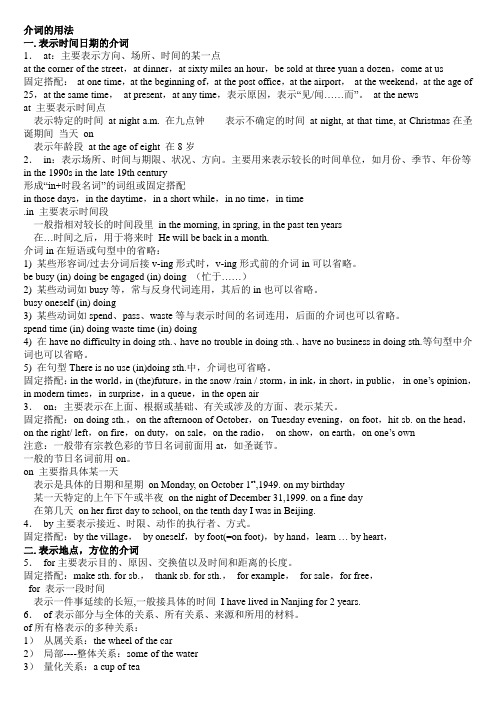
介词的用法一.表示时间日期的介词1.at:主要表示方向、场所、时间的某一点at the corner of the street,at dinner,at sixty miles an hour,be sold at three yuan a dozen,come at us固定搭配:at one time,at the beginning of,at the post office,at the airport,at the weekend,at the age of 25,at the same time,at present,at any time,表示原因,表示“见/闻……而”。
at the newsat 主要表示时间点表示特定的时间at night a.m. 在九点钟表示不确定的时间at night, at that time, at Christmas在圣诞期间当天on表示年龄段at the age of eight 在8岁2.in:表示场所、时间与期限、状况、方向。
主要用来表示较长的时间单位,如月份、季节、年份等in the 1990s in the late 19th century形成“in+时段名词”的词组或固定搭配in those days,in the daytime,in a short while,in no time,in time.in 主要表示时间段一般指相对较长的时间段里in the morning, in spring, in the past ten years在…时间之后,用于将来时He will be back in a month.介词in在短语或句型中的省略:1) 某些形容词/过去分词后接v-ing形式时,v-ing形式前的介词in可以省略。
be busy (in) doing be engaged (in) doing (忙于……)2) 某些动词如busy等,常与反身代词连用,其后的in也可以省略。
高一英语定语从句归纳整理
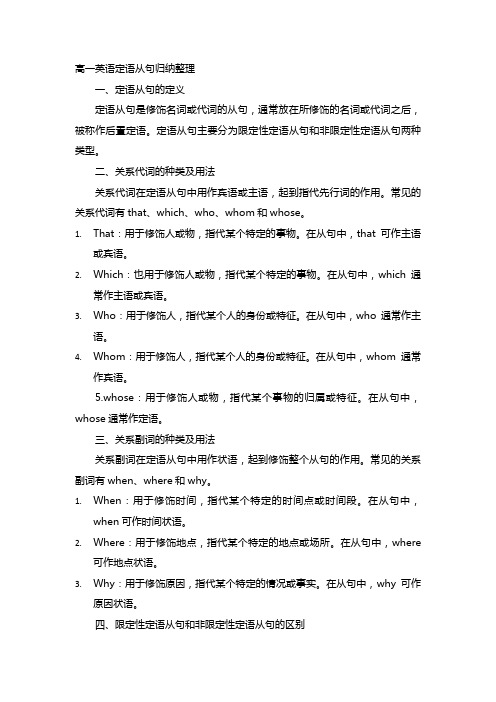
高一英语定语从句归纳整理一、定语从句的定义定语从句是修饰名词或代词的从句,通常放在所修饰的名词或代词之后,被称作后置定语。
定语从句主要分为限定性定语从句和非限定性定语从句两种类型。
二、关系代词的种类及用法关系代词在定语从句中用作宾语或主语,起到指代先行词的作用。
常见的关系代词有that、which、who、whom和whose。
1.That:用于修饰人或物,指代某个特定的事物。
在从句中,that可作主语或宾语。
2.Which:也用于修饰人或物,指代某个特定的事物。
在从句中,which通常作主语或宾语。
3.Who:用于修饰人,指代某个人的身份或特征。
在从句中,who通常作主语。
4.Whom:用于修饰人,指代某个人的身份或特征。
在从句中,whom通常作宾语。
5.whose:用于修饰人或物,指代某个事物的归属或特征。
在从句中,whose通常作定语。
三、关系副词的种类及用法关系副词在定语从句中用作状语,起到修饰整个从句的作用。
常见的关系副词有when、where和why。
1.When:用于修饰时间,指代某个特定的时间点或时间段。
在从句中,when可作时间状语。
2.Where:用于修饰地点,指代某个特定的地点或场所。
在从句中,where可作地点状语。
3.Why:用于修饰原因,指代某个特定的情况或事实。
在从句中,why可作原因状语。
四、限定性定语从句和非限定性定语从句的区别1.限定性定语从句:限定性定语从句与主句的关系十分紧密,缺之不可,对先行词起限定、修饰的作用。
如果将其去掉,会影响句子完整性,甚至意义不明。
限定性定语从句的先行词前面不可加其他定语修饰词,并且不用逗号隔开。
2.非限定性定语从句:非限定性定语从句起补充说明作用,缺少也不会影响全句的理解,它与主句之间通常用逗号隔开。
非限定性定语从句前面可以加其他定语修饰词。
非限定性定语从句先行词为专有名词或者具有特指性的名词时,一般不用that。
非限定性定语从句还可以由as引导。
(教师版)高一英语--定语从句(介词加关系代词引导定从)
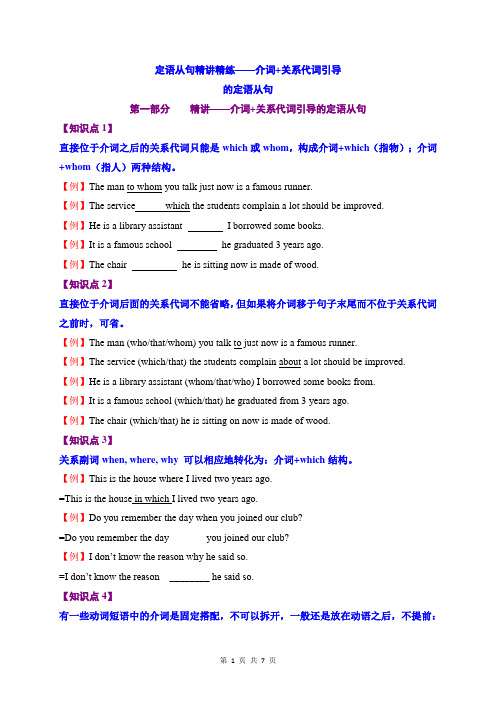
定语从句精讲精练——介词+关系代词引导的定语从句第一部分精讲——介词+关系代词引导的定语从句【知识点1】直接位于介词之后的关系代词只能是which或whom,构成介词+which(指物);介词+whom(指人)两种结构。
【例】The man to whom you talk just now is a famous runner.【例】The service which the students complain a lot should be improved.【例】He is a library assistant I borrowed some books.【例】It is a famous school he graduated 3 years ago.【例】The chair he is sitting now is made of wood.【知识点2】直接位于介词后面的关系代词不能省略,但如果将介词移于句子末尾而不位于关系代词之前时,可省。
【例】The man (who/that/whom) you talk to just now is a famous runner.【例】The service (which/that) the students complain about a lot should be improved.【例】He is a library assistant (whom/that/who) I borrowed some books from.【例】It is a famous school (which/that) he graduated from 3 years ago.【例】The chair (which/that) he is sitting on now is made of wood.【知识点3】关系副词when, where, why 可以相应地转化为:介词+which结构。
高一英语定语从句讲解精华版
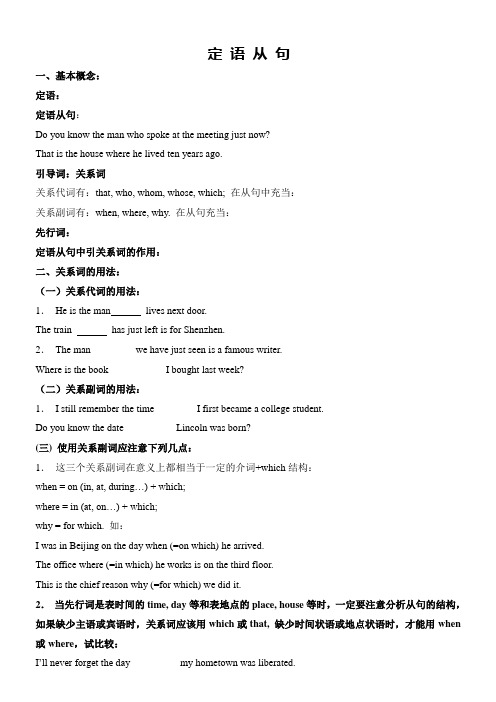
定语从句一、基本概念:定语:定语从句:Do you know the man who spoke at the meeting just now?That is the house where he lived ten years ago.引导词:关系词关系代词有:that, who, whom, whose, which; 在从句中充当:关系副词有:when, where, why. 在从句充当:先行词:定语从句中引关系词的作用:二、关系词的用法:(一)关系代词的用法:1.He is the man lives next door.The train has just left is for Shenzhen.2.The man ________ we have just seen is a famous writer.Where is the book ___________I bought last week?(二)关系副词的用法:1.I still remember the time ________I first became a college student.Do you know the date __________Lincoln was born?(三) 使用关系副词应注意下列几点:1.这三个关系副词在意义上都相当于一定的介词+which结构:when = on (in, at, during…) + which;where = in (at, on…) + which;why = for which. 如:I was in Beijing on the day when (=on which) he arrived.The office where (=in which) he works is on the third floor.This is the chief reason why (=for which) we did it.2.当先行词是表时间的time, day等和表地点的place, house等时,一定要注意分析从句的结构,如果缺少主语或宾语时,关系词应该用which或that, 缺少时间状语或地点状语时,才能用when 或where,试比较:I’ll never forget the day _________ my hometown was liberated.I’ll never forget the days____________we spent together last summer.His father works in a factory____________radio parts are made.His father works in a factory______________makes radio parts.三.限制性定语从句与非限制性定语从句1.限制性定语从句This is the telegram which he refers to.Is there anything (that) I can do for you?2.非限制性定语从句This note was left by Tom, who was here a moment ago.As a boy, he was always making things, most of which were electric.引导非限制性定语从句的关系词有who, whom, whose, which, when 和where不可以用that和why。
高一英语介词与非限制性定语从句结合单选题40题
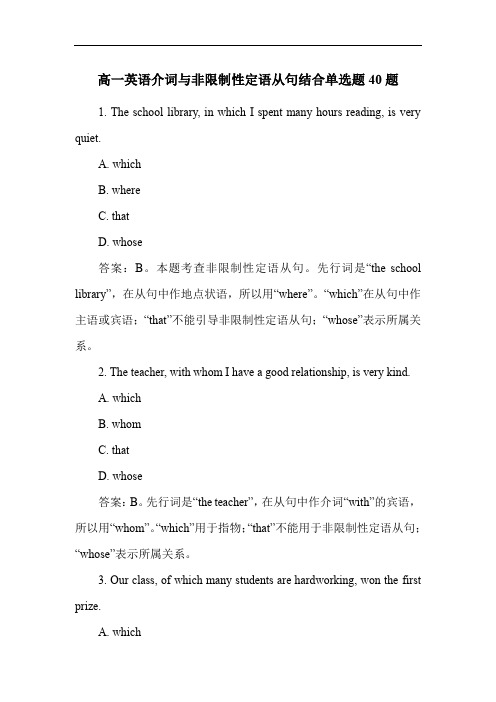
高一英语介词与非限制性定语从句结合单选题40题1. The school library, in which I spent many hours reading, is very quiet.A. whichB. whereC. thatD. whose答案:B。
本题考查非限制性定语从句。
先行词是“the school library”,在从句中作地点状语,所以用“where”。
“which”在从句中作主语或宾语;“that”不能引导非限制性定语从句;“whose”表示所属关系。
2. The teacher, with whom I have a good relationship, is very kind.A. whichB. whomC. thatD. whose答案:B。
先行词是“the teacher”,在从句中作介词“with”的宾语,所以用“whom”。
“which”用于指物;“that”不能用于非限制性定语从句;“whose”表示所属关系。
3. Our class, of which many students are hardworking, won the first prize.A. whichB. whereC. thatD. whose答案:A。
先行词是“our class”,“of which”表示“……的”,在从句中作定语,所以用“which”。
“where”在从句中作地点状语;“that”不能引导非限制性定语从句;“whose”表示所属关系。
4. The sports meeting, during which we had a lot of fun, was very successful.A. whichB. whenC. thatD. whose答案:A。
先行词是“the sports meeting”,在从句中作介词“during”的宾语,所以用“which”。
高中语法介词的固定搭配
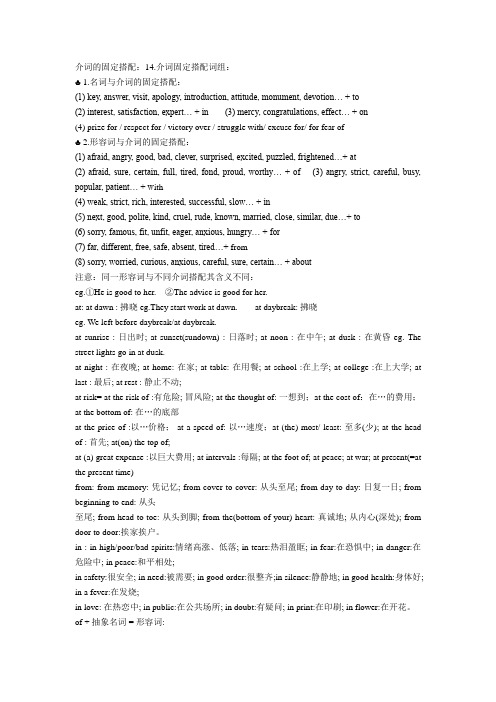
介词的固定搭配:14.介词固定搭配词组:♣ 1.名词与介词的固定搭配:(1) key, answer, visit, apology, introduction, attitude, monument, devotion… + to(2) interest, satisfaction, expert… + in(3) mercy, congratulations, effect… + on(4) prize for / respect for / victory over / struggle with/ excuse for/ for fear of♣ 2.形容词与介词的固定搭配:(1) afraid, angry, good, bad, clever, surprised, excited, puzzled, frightened…+ at(2) afraid, sure, certain, full, tired, fond, proud, worthy… + of (3) angry, strict, careful, busy, popular, patient… + w ith(4) weak, strict, rich, interested, successful, slow… + in(5) next, good, polite, kind, cruel, rude, known, married, close, similar, due…+ to(6) sorry, famous, fit, unfit, eager, anxious, hungry… + for(7) far, different, free, safe, absent, tired…+ from(8) sorry, worried, curious, anxious, careful, sure, certain… + about注意:同一形容词与不同介词搭配其含义不同:eg.①He is good to her. ②The advice is good for her.at: at dawn : 拂晓 eg.They start work at dawn. at daybreak: 拂晓eg. We left before daybreak/at daybreak.at sunrise : 日出时; at sunset(sundown) : 日落时; at noon : 在中午; at dusk : 在黄昏eg. The street lights go in at dusk.at night : 在夜晚; at home: 在家; at table: 在用餐; at school :在上学; at college :在上大学; at last : 最后; at rest : 静止不动;at risk= at the risk of :有危险; 冒风险; at the thought of: 一想到;at the cost of:在…的费用;at the bottom of: 在…的底部at the price of :以…价格; at a speed of: 以…速度;at (the) most/ least: 至多(少); at the head of : 首先; at(on) the top of;at (a) great expense :以巨大费用; at intervals :每隔; at the foot of; at peace; at war; at present(=at the present time)from: from memory: 凭记忆; from cover to cover: 从头至尾; from day to day: 日复一日; from beginning to end: 从头至尾; from head to toe: 从头到脚; from the(bottom of your) heart: 真诚地; 从内心(深处); from door to door:挨家挨户。
英语语法专题定语从句与固定搭配

英语语法专题定语从句与固定搭配高考英语语法专题定语从句专题一定语从句一、关系代词引导的定语从句1、that 指人或物在从句中作主语,宾语或表语which 指物在从句中作主语,宾语或表语(作宾语时可以省略)who 指人在从句中作主语,宾语或表语whom 指人在从句中作宾语whose 指人或物在从句中作定语as 指人或物在从句中作主语,宾语或表语but 指人或物在从句中作主语,宾语或表语注意:指物时,whose+名词=the+名词+of which或 of which+the+名词2、as 的用法(1)常用于下列结构:such…as; so…as;the same…as; as…as注意:the same…as 表示同一类,不同一个the same…that 表示同一个(2)as与which的区别a、位置不同as可放在主句后,主句前或主句中间;which只能放在主句后。
b、as起连接作用,表达说话人的观点、看法,并指出主句内容的根据或出处,意为“正如,正像”。
Which相当于并列句,可以用and this来代替,意为“这一点,这件事’”。
注意:as常用于下列结构:as we know/ as is known to all, as we all can see, as has been said before/above,as might be excepted, as is often the case, 一般不能用which代替as。
c、在从句中作主语时,which既可作系动词be的主语也可作实义动词的主语,而as只可作系动词be的主语。
二、只用that不用which的情况1、.先行词为 all , much, everything, nothing , something ,anything, nothing, none, the one等不定代词时2、先行词被only, any, few, little, no , all, just , very ,right等修饰时.3、当先行词是最高级或被形容词最高级修饰时。
高一定语从句 40个常考不及物动词 与介词固定搭配
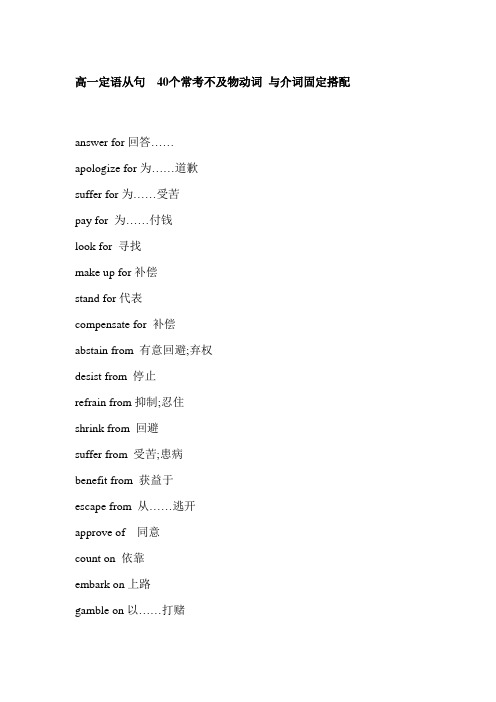
高一定语从句40个常考不及物动词与介词固定搭配answer for回答……apologize for为……道歉suffer for为……受苦pay for 为……付钱look for 寻找make up for补偿stand for代表compensate for 补偿abstain from 有意回避;弃权desist from 停止refrain from抑制;忍住shrink from 回避suffer from 受苦;患病benefit from 获益于escape from 从……逃开approve of 同意count on 依靠embark on上路gamble on以……打赌insist on坚持……rely on依靠theorize on 对……推理;对……建立理论harp on 老提到……calculate on 指望;依靠concentrate on 集中到……depend on依靠reckon on盼望;指望……account for 说明;解释……boast of 吹牛consist of 由……组成despair of 失望dream of 梦想做某事repent of 忏悔;懊悔believe in 相信……persevere in 坚持……revel in 陶醉;着迷于……succeed in 在某方面成功delight in 为……高兴join in 加入……participate in 参加……persist in 坚持……specialize in 专门从事某事; 在某方面专长aim at 瞄准于……chafe at 恼怒;不满frown at 向……皱眉头scowl at 沉下脸……;对……皱眉laugh at 嘲笑smile at向……微笑work at 从事于……;用功于……look at 看着……attend to 参加……certify to 证明……confess to 承认……descend to 下降到……object to 反对……react to 对某事作出反应refer to 提到……resort to 求助;采用……see to 检查……submit to 提交……testify to 表明;说明……turn to 转向……fall to 下跌;减弱。
定语从句的不及物动词
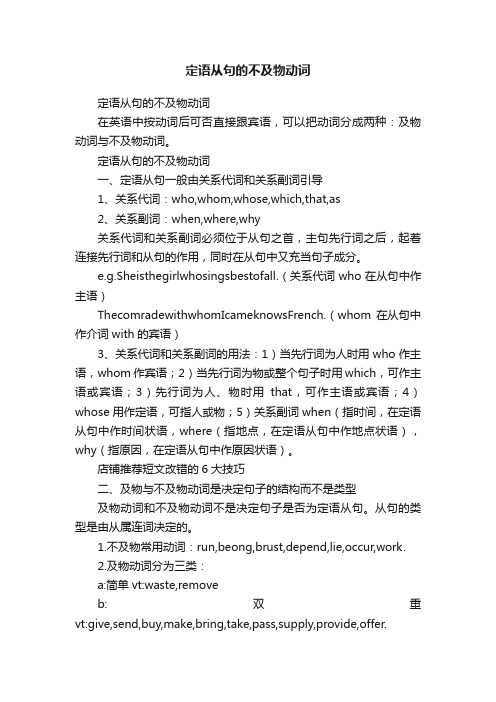
定语从句的不及物动词定语从句的不及物动词在英语中按动词后可否直接跟宾语,可以把动词分成两种:及物动词与不及物动词。
定语从句的不及物动词一、定语从句一般由关系代词和关系副词引导1、关系代词:who,whom,whose,which,that,as2、关系副词:when,where,why关系代词和关系副词必须位于从句之首,主句先行词之后,起着连接先行词和从句的作用,同时在从句中又充当句子成分。
e.g.Sheisthegirlwhosingsbestofall.(关系代词who在从句中作主语)ThecomradewithwhomIcameknowsFrench.(whom在从句中作介词with的宾语)3、关系代词和关系副词的用法:1)当先行词为人时用who作主语,whom作宾语;2)当先行词为物或整个句子时用which,可作主语或宾语;3)先行词为人、物时用that,可作主语或宾语;4)whose用作定语,可指人或物;5)关系副词when(指时间,在定语从句中作时间状语,where(指地点,在定语从句中作地点状语),why(指原因,在定语从句中作原因状语)。
店铺推荐短文改错的6大技巧二、及物与不及物动词是决定句子的结构而不是类型及物动词和不及物动词不是决定句子是否为定语从句。
从句的类型是由从属连词决定的。
1.不及物常用动词:run,beong,brust,depend,lie,occur,work.2.及物动词分为三类:a:简单vt:waste,removeb:双重vt:give,send,buy,make,bring,take,pass,supply,provide,offer.c:复杂vt:使役动词:如make.let任命,命名:nameappiont感知:see,hear,lookat,watch,observe,notice.例句1.你昨天错过的会议非常重要.The meeting that you have missed yesterday was very important.2.正在做演讲的女孩是我们班的班长.The girl who is making a speech right now is our monitor.3.我昨天打坏的花瓶是很昂贵的.The vase that I broke yesterday was very expensive.4.昨天帮助了你的男孩是我的邻居.The boy who helped you yesterday is my neighbour.5.这正是我所感兴趣的'话题.That's just the topic that I'm very interested in.6.这是那个给我提供了宝贵机会的老板.He is just the boss who gave me that valueable opportunity.7.这个话题是我感到厌倦的.This is the topic/theme that I'm tired of.8.他是那个帮助了我的老师.He is the teacher who helped me.9.我们很喜欢那个很幽默的演讲者.We all like that speaker who is very humourous.10.两个女儿都是教师的那个老奶奶是我们的邻居.The old lady whose two daughters are both teachers is our neighbour。
- 1、下载文档前请自行甄别文档内容的完整性,平台不提供额外的编辑、内容补充、找答案等附加服务。
- 2、"仅部分预览"的文档,不可在线预览部分如存在完整性等问题,可反馈申请退款(可完整预览的文档不适用该条件!)。
- 3、如文档侵犯您的权益,请联系客服反馈,我们会尽快为您处理(人工客服工作时间:9:00-18:30)。
高一定语从句 40个常考不及物动词与介词固定搭配
answer for回答……
apologize for为……道歉
suffer for为……受苦
pay for 为……付钱
look for 寻找
make up for补偿
stand for代表
compensate for 补偿
abstain from 有意回避,弃权
desist from 停止
refrain from抑制,忍住
shrink from 回避
suffer from 受苦,患病
benefit from 获益于
escape from 从……逃开
approve of 同意
count on 依靠
embark on上路
gamble on以……打赌
insist on坚持……
rely on依靠
theorize on 对……推理,对……建立理论harp on 老提到……
calculate on 指望,依靠
concentrate on 集中到……
depend on依靠
reckon on盼望,指望……
account for 说明,解释……
boast of 吹牛
consist of 由……组成
despair of 失望
dream of 梦想做某事
repent of 忏悔,懊悔
believe in 相信……
persevere in 坚持……
revel in 陶醉,着迷于……
succeed in 在某方面成功
delight in 为……高兴
join in 加入……
participate in 参加……
persist in 坚持……
specialize in 专门从事某事,在某方面专长aim at 瞄准于……
chafe at 恼怒,不满
frown at 向……皱眉头
scowl at 沉下脸……,对……皱眉
laugh at 嘲笑
smile at向……微笑
work at 从事于……,用功于……
look at 看着……
attend to 参加……
certify to 证明……
confess to 承认……
descend to 下降到……
object to 反对……
react to 对某事作出反应
refer to 提到……
resort to 求助,采用……
see to 检查……
submit to 提交……
testify to 表明,说明……
turn to 转向……
fall to 下跌,减弱。
